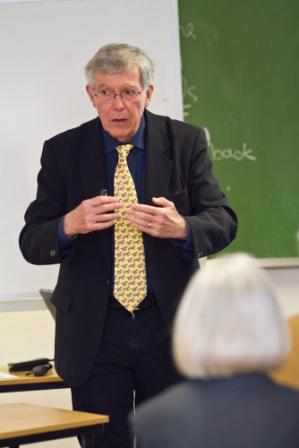
Emeritus Professor Deryck Schreuder, former Vice-Chancellor of two Australian universities, including the University of Western Australia, was at Rhodes recently to share his views on the role of the university in contemporary society.
In problematising the notion of the university, Prof Schreuder unpacked the various material, political and ideological challenges the institution faces and suggested the possible transformations it will undergo in the future.
Having graduated from Rhodes University in 1960 with an undergraduate degree in history, Prof Schreuder has had a long career in education and scholarship, and is currently Visiting Professor in the Faculty of Education and Social Work at the University of Sydney and an Adjunct Professor at the Humanities Research Centre at the Australian National University. He is Chair of the Board of the Australian Universities Quality Agency and was recently named a member of the Development Advisory Group for the Research Quality Framework and the convenor of the annual national conference on university governance.
Using trends in the Australian higher education sector as case studies for his talk Prof Schreuder said it is imperative that critical thought be applied to the changing state of universities, “some of which only marginally deserve the title”.
In his talk entitled, “Why universities? Perspectives from the 'revolution' in Australian higher education since 1990”, Prof Schreuder provided an overview of the “silent revolution” in higher education, citing trends in globalisation, corporatisation and internationalisation. In highlighting the “mutation and mutability” of universities, Prof Schreuder said he believes that the institution as we know it will change dramatically in the next few decades, and could be unrecognisable within 50 years. “This is the third oldest western institution in history; it has gone through huge changes. People living in the first few phases of its existence wouldn’t even recognise it today,” he said. These changes could include trends toward “knowledge nations”, life-long learning, increasingly emphasised graduate outcomes and e-institutions as a result of trends in corporatisation, globalisation and internationalisation. Comprehensive, campus-based public universities are in decline, he said, although Ivy League institutions should survive the changes.
In an overview of the seven deadly dichotomies challenging universities, Prof Schreuder included the high quality of education expected but the mass systems required, praise for academic autonomy coupled with expectations around social engagement, venerable traditions, narrow instrumentalism and the tendency toward homogenisation. “There has been a failure to sustain diversity and distinctiveness. The heart of the matter is the state of the academic heartland. To what extent are we confident to assert that our institutions are about the contestation of knowledge?”
While a certain amount of change is understandable Prof Schreuder said, academics should be mindful of unnecessary or callous influences, which could undermine or jeopardise the institution. Highlighting the various “revolutionary consequences”, including the social needs thesis, “massification” and internationalisation, Prof Schreuder said it is imperative for academics to retain a sense of agency during times of change. “Unless there’s agency in the process the changes just happen to you because they are happening out there,” he said.
Prof Schreuder is Chair of the Australian Universities Quality Agency, Visiting Professor, The University of Sydney, and Adjunct Professor, The Humanities Research Centre, Australian National University. He was the 16th Vice-Chancellor and President of The University of Western Australia (1998-2004), President of the Australian Vice-Chancellor’s Committee during the Nelson “Crossroads Review” of higher education in Australia (2002-3) and a member of the Council of the Association of Commonwealth Universities. Prof Schreuder has served extensively on professional bodies, as Chair of the AVCC’s Standing Committee on Research, and a wide range of Australian Research Council committees and panels, as well as being a Director of IDP Australia, and the Business Higher Education Round Table.
Prof Schreuder is a scholar of modern international history with a special interest in colonial and post-colonial societies, on which he has written extensively in many scholarly publications. He is currently working on the “Australia” volume in the Oxford History of the British Empire. In 2004 Rhodes University conferred the degree of Doctor of Laws (honoris causa) on Prof Schreuder as part of its Centenary Celebrations.
By Sarah-Jane Bradfield
Picture: Emeritus Professor Deryck Schreuder
Picture by Judith Doubell
